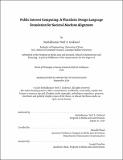Public Interest Computing: a Pluralistic Design Language Foundation for Societal-Machine Alignment
Author(s)
Gaikwad, Snehalkumar 'Neil' S.
DownloadThesis PDF (84.84Mb)
Advisor
Wood, Danielle
Terms of use
Metadata
Show full item recordAbstract
The proliferation of algorithmic systems, including artificial intelligence (AI), in decision-making contexts necessitates a critical examination of their alignment with societal and environmental values. The reciprocal relationship between these norms and emerging AI technologies calls for a structural conceptualization of algorithmic systems that extends the scale of human-centered considerations. This dissertation introduces “Public Interest Computing, a Pluralistic Design Language,” which enables a novel design space for value-sensitive algorithmic ecosystems, fostering what we term “Societal-Machine Alignment.” The research is structured in three interconnected parts. First, we establish a comprehensive theory of Public Interest Computing, grounded in the planning and capability approach to human development. Second, we present a series of Public Interest Computing systems that instantiate and refine the proposed theoretical framework. These systems, co-designed with communities, demonstrate societal-machine alignment through five key design dimensions. Farm Pulse System exemplifies substantive fairness for at-risk farmers by enabling restorative justice through recourse in climate change adaptation decisions. Boomerang exhibits incentive alignment, promoting equitable designs of reputation systems in AI data markets. The Prototype Tasks System illustrates computationally mediated cognitive alignment, creating a level playing field for workers. The Beyond Boundaries framework enables environmental alignment, providing a platform for public discourse on climate change. Our analysis using Gobo focuses on value alignment, investigating ways to increase human agency in interactions with invisible algorithms on online platforms. Each system serves as an empirical testbed, providing critical design insights that shaped the theory and engineering of Public Interest Computing.
The third part demonstrates the interplay between the developed Public Interest Computing systems and policy by applying the Pluralistic Design Language to real-world scenarios. We illustrate
the bidirectional relationship between technology and policy, showing how Public Interest Computing informs policy decisions (“AI for Policy”) and, conversely, how policy shapes the responsible development of AI systems (“Policy for AI”). This symbiotic relationship opens new avenues for
evidence-based policymaking, with Public Interest Computing serving as a foundation. By synthesizing the insights gained from this demonstration, we offer a principled approach for future
research and practice, paving the way for a more informed and responsible design of algorithmic
systems that aligns with societal values and priorities.
Public Interest Computing and its Pluralistic Design Language serve as a guiding lens, leading us
towards a future where societal values and algorithmic ecosystems are inherently aligned. Public
Interest Computing is not an end in itself but a means for understanding, reflection, and adaptation, ensuring that as technology advances, so does our commitment to aligning it with the greater
good.
Date issued
2024-09Department
Program in Media Arts and Sciences (Massachusetts Institute of Technology)Publisher
Massachusetts Institute of Technology